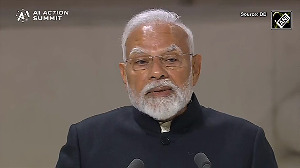In February, I met an economic expert working for the BJP at a seminar abroad. Its 'India Shining' campaign was in full blast at that time and the media had practically written off the Congress (I). I told the BJP expert that 2004 could see a repeat of 1980, when everybody had written off Indira Gandhi's Congress (I), but to the surprise of many, she and her party bounced back to power. India Today was the only journal to have correctly sensed the mood of the people and forecast her possible return to power.
He asked me why I thought so. I told him that whoever had advised the BJP to embark on its 'India Shining' campaign had done it a tremendous disservice. The only people who had prospered were the rich and upper middle class, but for the rest, things had not changed much. I added: "Those who have prospered do not need an advertising campaign to tell them that they have. Those, who have not, will hold it against you because this prosperity has not touched them."
I also said that all over the world, political parties avoid overtures to a national adversary on the eve of elections. On the contrary, they try to step up the rhetoric against the adversary ."By toning down your campaign against Pakistan on the issue of terrorism, you have totally demobilised many of your traditional supporters."
He did not agree with me. Subsequently, during my visits to New Delhi to attend meetings and seminars, whenever I was asked about my assessment of the electoral scene, I have been repeating like a parrot 'watch out, 1980 is going to repeat itself,' giving the same reasons.
Well, it has repeated itself.
Spin is a double-edged sword. In certain circumstances, it can help one project oneself in better light and in certain other circumstances, it can be self-destructive. Over-use of spin by the BJP in its 'India Shining' campaign created feelings of revulsion in large sections of the population, which have not benefitted from the economic development and who have, on the contrary, suffered due to drought and other reasons. The BJP unwittingly created an image of itself as a party of the rich, by the rich and for the rich.
In the elections of 1998 and 1999, the BJP had very effectively played the national security card. It had successfully projected the Congress (I) as having rendered India a soft state unable to deal with Pakistan-sponsored terrorism. Having made a series of overtures to Pakistan and toned down its highlighting of Pakistan-sponsored terrorism as a continuing threat to national security, it was unable to use the national security card this time.
Traditionally, the Congress (I) leadership has always had a better feel of the pulse of the South than the BJP. The BJP leadership misread and misjudged the South very badly .Tamil Nadu gave the BJP's hopes of continuing in power a kiss of death.
The elections have had their positive side as well as the negative. On the positive, one should underline the successful conduct of this massive exercise by the Election Commission and the gracious manner in which the NDA has accepted defeat and made way for the Congress (I)-led coalition. Compare this to what often happens in some other democracies where a defeated party declines to bow out in grace, thereby discrediting the entire democratic process.
On the negative, one could refer to the defeat of the governments of Chandrababu Naidu in Andhra Pradesh and S M Krishna in Karnataka. Both of them had many faults, but even their worst detractors have to concede that they were modern minded and realised that if India has to progress fast, it can't afford to have populist policies such as the 'rice at two rupees a kilo' of the late N T Rama Rao or 'free power to the farmers' promised by the AP Congress(I) in the election. Their defeat would make future politicians hesitate to give up economic populism, thereby retarding our economic development and our efforts to catch up with China.
When Deng Xiaoping opened up China in 1979, he initially decided to concentrate on the economic development of the two coastal provinces of Guangdong and Fujian and Shanghai. Between 1979 and 1992, only these two provinces and Shanghai progressed fast. The rest of China remained untouched by this prosperity.
He told the people in the rest of China: 'Let them get rich first. You will get rich later.' He succeeded in keeping them patient. Moreover, in a dictatorial state like China,the people had no other option but to remain patient and await their turn to prosper.
Unfortunately, in a democracy like India, leaders such as Naidu and Krishna cannot tell the people: 'Let the Tatas and Birlas and Premjis get rich first. You can get rich later.' Everybody wants to get rich at the same time. If they don't, down falls your head.






 © 2025
© 2025